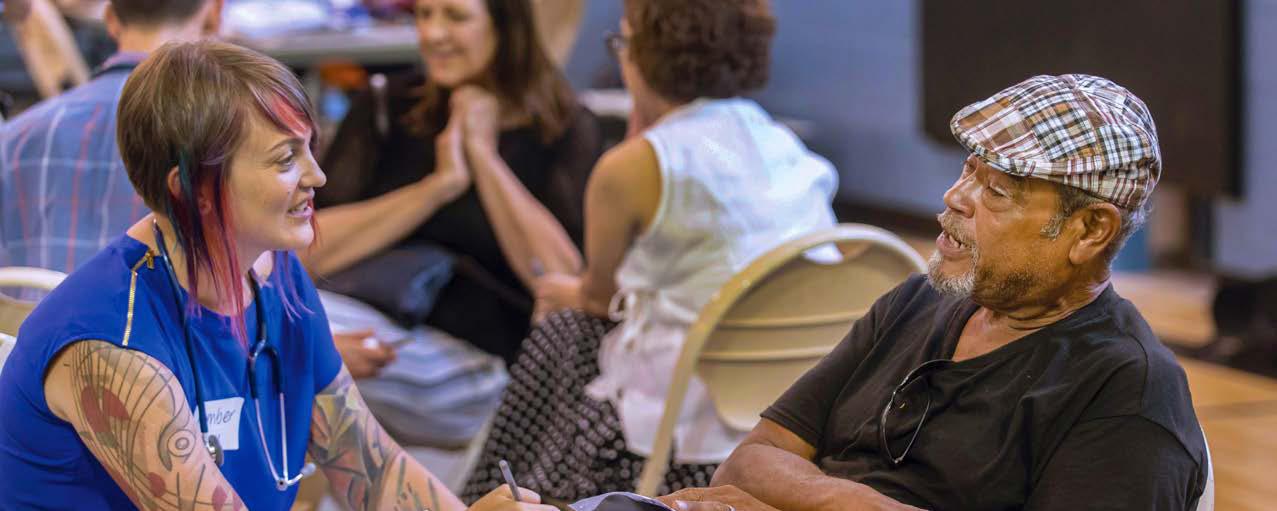
7 minute read
Commitment to Diversity, Equity, and Inclusion
RUTH SHIM REPORT
Our department’s Diversity, Equity, and Inclusion (DEI) Council recommended that we commission an evaluation by an outside, independent consultant to examine the department’s culture and practices. Toward this purpose, in the fall of 2020 the department hired Ruth Shim, M.D., MPH., the Luke & Grace Kim Professor in Cultural Psychiatry and Associate Dean of Diverse and Inclusive Education at the University of California Davis School of Medicine.
Dr. Shim gathered information from individual and group interviews with stakeholders in the department, leadership, and key Dell Medical School leaders. Data and metrics were provided by department and medical school staff members.
As a result of her work with our department, Dr. Shim made recommendations for achievable actions that the department can take to be a leader in DEI in academic psychiatry departments. She found that our department has numerous strengths and opportunities that make these goals attainable. In the months since the report was published, the department has been working toward recruiting an associate chair for DEI, and department leadership is continuing to work on salary equity. Additionally, we are recruiting using the job boards recommended in the report.
The Women of Academic Psychiatry (WAP) is a peer mentoring group that was started by Drs. Tawny Smith and Erica Garcia-Pittman in 2019. The initial goals for the group were to create a safe space for fellowship/support and to discuss and address challenges as women in all aspects of academic medicine. This diverse group has more than 20 members from different professional stages — from early career, to residency, to faculty — and meets every six weeks to continue small group discussions and to share resources and successes.
Each scheduled WAP meeting is centered around articles designed to enhance skills or explore common themes. In addition to discussing concerns and challenges, participants spend time on personal and professional development, with focus on promotion/work-life success. Common discussion threads include concerns for the women in our department around burnout, retention, lack of formal mentorship opportunities, and leadership diversity. And like many others during COVID19, the group has spent time discussing work-life balance and challenges related to virtual care.
New adventures for Women of Academic Psychiatry members include participation in larger diversity, inclusion and equity initiatives at Dell Medical School to support female faculty members, trainees and students. WAP members have attended the Women’s Leadership Conversations Series and hosted discussions with previous Department of Psychiatry & Behavioral Sciences Grand Rounds speakers Carol Tamminga, M.D., and Karen Dineen Wagner, M.D., Ph.D.. WAP members Erica GarciaPittman, M.D., Robin Hilsabeck, Ph.D., ABPP, and Virginia A. Brown, Ph.D., have joined the Dell Medical School Women’s Equity in Leadership Council as representatives of the departments of Psychiatry & Behavioral Sciences, Neurology and Population Health. One goal of the organization is to begin a Women’s Group for psychiatry residents that will be mentored by Women of Academic Psychiatry Faculty. WAP anticipates creating a local chapter of Women in Medicine and Science at Dell Medical School in the year ahead.
CULTURE AND DIVERSITY COMMITTEE
The Culture and Diversity Committee for pediatric psychiatry and psychology faculty members, led by co-chairs Ankita Krishnan, Ph.D., and Oscar Widales-Benitez, Ph.D., actively promotes diversity, equity and inclusion efforts across the program. The committee emphasizes advocacy for the provision of culturally sensitive services and supports among the behavioral health faculty and trainees at Dell Children's Medical Center. During the past year, the committee conducted a needs assessment within the department to better understand professional development needs; recruited speakers to increase awareness of biases; and provided education on how to support marginalized populations. Additionally, the committee conducted seminars on cultural humility for incoming interns and postdoctoral fellows. The organization continues to focus on growth in these areas.
Tawny Smith Erica Garcia-Pittman Ankita Krishnan Oscar Widales-Benitez

CURRICULUM DEVELOPMENT
Ashley Trust, M.D., associate program director of general adult psychiatry, and her team, Kristin Escamilla, M.D., Erica Garcia-Pittman M.D. and Virginia Brown, Ph.D., created a novel, community-based curriculum to teach health equity using the framework of structural and cultural competency. This is one of the first formal health equity curriculums implemented within Dell Med graduate medical education. This work was showcased at Dell Med’s Medical Education Grand Rounds and The Diversity Town Hall in April and May of 2021. The curriculum has also been presented at various conferences, and the team is composing a manuscript describing this important work.
DELL MEDICAL SCHOOL OFFICE OF DIVERSITY, EQUITY, AND INCLUSION CHANGE AGENT
Suzannah Creech, Ph.D., is our department’s representative in the Dell Med Change Agent Certificate Program hosted by the Office of Diversity, Equity and Inclusion. She attends monthly seminars and support circles and in the year ahead will contribute to a team project, as well as serving as a resource to our department.
ODEI Change Agent courses so far have included Strategies for an Equitable Workplace, Legacy of Race and Racism in the U.S., Identifying and Interrupting Sexism, and Inclusive Culture and Embracing Diversity. The dynamic and interactive courses typically have reading to complete ahead of time, and they are attended by change agents and department leaders across Dell Med. Peer support circles are held monthly, and all change agents are invited to attend and support one another in their daily change agent work. In the next phase of the program Dr. Creech will participate in a team project. Ultimately, she and other psychiatry faculty members who participate in future cohorts will help our department leaders develop and maintain an equitable and anti-racist culture across our research, education, and clinical missions.
Ashley Trust Kristin Escamilla Virginia Brown Suzannah Creech
Advancing diversity, equity and inclusion at The University of Texas at Austin is a critical goal. According to 2020 data, 83% of psychologists in the U.S. workforce were white. Only 7% of psychologists were Hispanic, 4% were Asian, 3% were Black/African American and 2% were multiracial or from other racial/ethnic groups.
This is not representative of the U.S population and significantly less diverse than our country as a whole, which is about 40% racial/ethnic minority. An unrepresentative group of psychologists creates an additional barrier to much needed mental health care. Individuals are less likely to seek help if they think their doctor cannot understand or empathize with their background or cultural differences and experiences. Race/ethnicity is just one dimension of diversity that is underrepresented in psychology.
Motivated to do something about this disparity, David Heckler, Ph.D., ABPP, assistant professor, applied for and was awarded an Actions that promote Community Transformation (ACT) grant through The University of Texas at Austin. He has used the funds to establish a program called “Building a More Diverse and Inclusive Field of Psychology.” The program seeks to actively and intentionally build an inclusive field of psychology by helping historically underrepresented individuals pursue graduate training in psychology. A cornerstone of the program is a virtual weekend workshop to help undergraduates find experiences to build their CV, identify graduate programs that meet their needs and interests, and prepare graduate school applications. Undergraduate students are matched to a mentor (i.e., faculty member, fellow, intern, graduate student) to provide individualized guidance. Students who participate in the program were recruited from several undergraduate institutions, including UT Austin, UT Rio Grande Valley, Texas State University and St. Edward’s University.
Participants are undergraduates with membership in one or more underrepresented groups, including but not limited to, non-cis-gendered individuals, members of the queer community, BIPOC (Black, Indigenous, and People of Color), people with different abilities or who experience disability, first-generation college students, and those from low-resource backgrounds.
David Heckler Ph.D., ABPP
ASSISTANT PROFESSOR, PEDIATRIC PSYCHOLOGIST
2020 PROGRAM ACCOMPLISHMENTS
Undergraduate Mentor Program
• Applicants Requesting a Mentor — 132
• Mentees Matched to Mentors — 78
• Mentors — 52
Weekend Workshop Data
• Undergraduate Participants — 23
• Number of Unique Undergraduate
Institutions — 8
Feedback from Mentees in 2020
“I think it was such a relief to have someone reach out and say, ‘I know this is a complicated process, but I'll be here when you need anything.’ It is so nice to have a resource to reach out to with questions when it seems so confusing.” “Dr. Laguna (Christine Laguna, Ph.D., assistant professor) helped me with my graduate application documents, and I got accepted! She also helped me look into entry-level jobs, but now I know more about how to step inside the field I want. She was always making sure of my interest and what I needed to expect from the psychology field. She was also helping me and encouraging me. I could go on with all the help she provided. She was amazing!”








